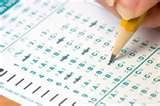Sandy Kress wrote a Sept. 29 column for the Austin American-Statesman entitled “Kress: The Facts on School Accountability.” Sandy Kress is known as a key architect of the No Child Left Behind (NCLB) education reform passed in 2002 and is now a handsomely paid lobbyist for Pearson Education. Pearson is a testing company which gets nearly $100 million a year for Texas school exams and will have received $1 billion by 2015 according to recent media reports.
Not surprisingly, Sandy Kress claimed that Texas test scores had benefited from NCLB, that minority students have shown “amazing gains” under the National Assessment for Education Progress (NAEP) and that we should “stay the course.”
Is it “fact” that Texas is knocking it out the park on the NAEP due to accountability “working”? The NAEP is a national exam that has been administered for the past 44 years by the National Center for Education Statistics. The test is given to a sampling of students across the country in the 4th, 8th and 12th grades and is commonly referred to as the Nation’s Report Card. In his opinion piece, Kress made the following statements about Texas minority students and their progress since 1992 on the NAEP:
Fourth-grade Hispanic students are up an amazing 2½ grade levels in math (208-235). The gap between these white and minority 4th graders has narrowed by between half to one full grade level. In eighth-grade math, black students are 3 ½ grade levels ahead of where they were in 1992 (243-277). Hispanic students are up by this same remarkable amount (249-283).
His “facts” were inaccurate and cursory.
Dr. Arnold Goldstein, Program Director of Reporting and Dissemination in the Assessment Division of the NCES, reviewed Kress’ column and looked at his statements. In an email, Goldstein said that NCES does not support the way Kress interpreted the changes in scores from one year to another as “grade level” increases. Goldstein stated,
Students learn different material at each grade, by the NAEP assessment at a given give, e.g. grade 4 only tests what students should be learning at that grade… That students in that grade in 2011 performed better than their counterparts in the early 1990s means that they have learned the 4th grade subject matter more than the students who took the assessment in the earlier year. But it is still 4th grade material, not what they might learn in grades 5, 6, or 7.
Notably, Diane Ravitch levied a similar critique of the inaccurate NAEP “analysis” used by the popular documentary film Waiting for Superman.
It is also important to put into context the Texas NAEP scores relative the nation. A recent report that I authored and was released by the University of Texas at Austin’s Institute for Urban Policy Research & Analysis (IUPRA) entitled Is Texas leading its peers and the nation?: A Decadal Analysis of Educational Data found that over the past decade Texas dropped 21 spots in 4th grade math, four spots in 4th grade reading, and eight spots in 8th grade reading. The only bright spot was that Texas improved its standing by the end of the decade in 8th grade math, moving from 22nd to 18th. Thus, Kress has glossed over how poorly Texas actually performed over the past decade relative to the rest of the nation on the NAEP.
Regarding his claims on the relationship between accountability and test scores, empirical evidence is also contrary to his claims. In fact, according to a Stanford University study by Professor Sean Reardon, the most recent statistical research has shown that the slope of improvement has been lower on the NAEP after the passage of NCLB than prior to the law. Reardon’s study also found that it will take 80 more years to close the achievement gap on the NAEP based on the slope of change during the past decade of NCLB.
In sum, Kress has not presented “facts,” so it is “nasty and unwarranted” to misuse data to make inaccurate assumptions about the relationship between NAEP test scores and accountability.
There are alternatives to NCLB in its current conception, I have argued here on Cloaking Inequity since October 2012 for a Community-Based Accountability approach which emphasizes multiple measures and local control. The High Performance Coalition created by SB 1557 in 2011 has proposed adopting this approach and it’s a conversation that appears to be building momentum in the Texas Legislature (See for example HB640). Now that there is a new idea on the table for the design of accountability that emphasizes local control yet focuses on a larger compliment of student outcomes in addition to tests, it will be interesting whether policymakers in Austin and DC will seek to be more thoughtful about our current educational policy.

Notwithstanding the need for accountability. we need to face the fact that NCLB was a politically-motivated piece of legislature. Measures developed by incumbents he educational system might have been far more adequate. Until we do exactly that, we are going to continue to experience a lot of erroneous comments based on politically-motivated analyses.
LikeLike
Have you heard much about the Seattle boycott on standardized tests? I linked the article here: http://thegeometryteacher.wordpress.com/2013/01/19/why-arent-more-people-talking-about-this/ although I your analysis in this article is far beyond mine. Mine is more like a new reporting, but I would be interested in your take on that development.
LikeLike
The fact that Sandy Kress is a lobbyist for Pearson strips him of all credibility. He has made a ton of money off the testing industry and will bend over backwards to prove the importance and validity of high-stakes testing in public education. Great post.
LikeLike